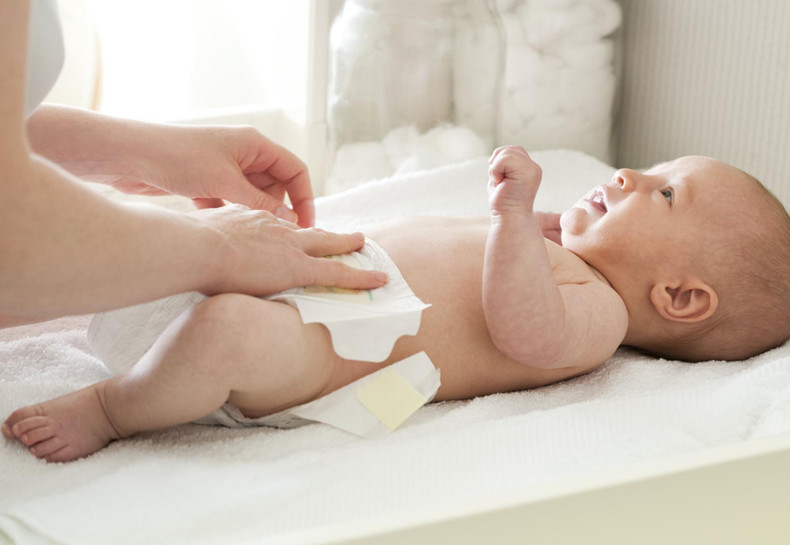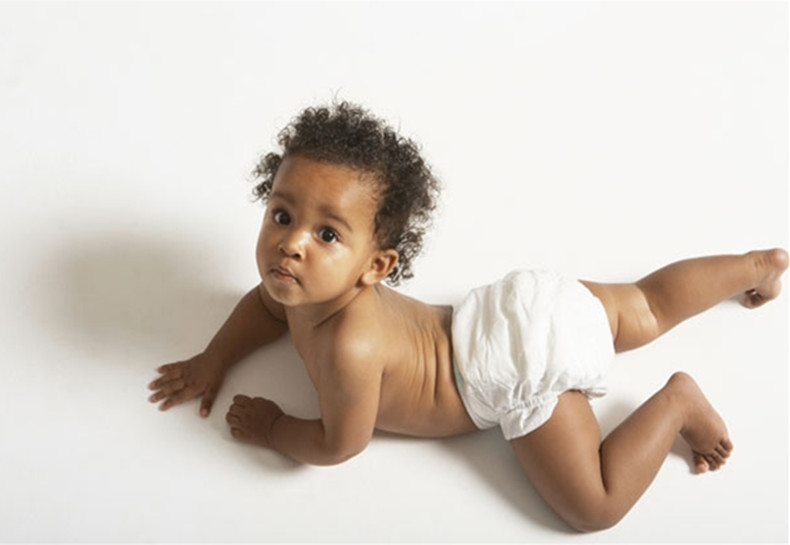How to Prevent Diaper Rash When Wearing Diapers for Babies in Summer?
In fact, it is not difficult to prevent your baby's red butt. Your baby's red butt is caused by being surrounded by your own urine for a long time. To prevent red butt, you only need to break these conditions one by one.
1. Change Diapers Frequently
If you want to put an end to red ass, you must change your baby's diapers frequently. Because it is summer and the weather is relatively hot, if you don’t change diapers for a long time, your baby’s butt will be surrounded by sweat as well as urine.
Babies less than 3 months old are best changed every two hours
Babies over 3 months can change every 2-3 hours
Babies older than six months can change every 3-4 hours.
And when changing diapers, if the baby has a bowel movement, be sure to wash the baby's butt with warm water, and then use a clean towel to lightly dry the moisture, and then put the baby on the bed to let the butt natural Let it dry. After the butt dries, apply a layer of diaper cream for the baby. You can use peanut oil, comfrey oil, tea oil and so on. Finally, help the baby put on clean diapers.
Reminder: If the baby is only peeing, you don't need to wash the baby's butt every time, you can wash it once in the morning, midnight and evening. But if it’s pulling, it’s necessary to wash the baby's butt clean every time.

2. Wear Suitable Diapers for Your Baby
When we choose diapers for babies, newborn baby diaper size is the very first thing that should be considered. We must choose the right diapers, because they are too small for babies to wear tightly. If they are too large, they will not be able to hold their bowels, and even if they are worn, they will not have the desired effect. In addition to the right size, we also need to choose a softer and more comfortable diaper for the baby, preferably a lighter and thinner diaper.
When choosing diapers for your baby, you can choose according to your baby's age, weight, or how it feels to wear on the body. The most practical thing is to see the effect of the baby on the body:
(1) See if there are strangulation marks on the baby’s legs
When moms and dads help babies change diapers, they can see if there are any signs of strangulation on the baby’s thighs. If there are any, it’s usually because the diapers are too small. Some babies are of moderate weight but have thicker thighs. At this time, even if the weight and age are suitable for this size of diaper, we should also change the size of the baby's diaper.
After some babies wear diapers, the butt is loose, and the rubber bands are not attached to the roots of the thighs, and urine and urine can easily penetrate the side, indicating that the diapers are too big.
(2) See the effect after use
If the baby can use a diaper for two hours, but now it can only be used for one hour, or the baby’s urine leaks out on the back, it means that the baby’s diaper is already small and needs to be replaced with a larger diaper.
(3) Look at waist circumference
Generally, there are Velcro on diapers. If the Velcro has been opened to the most side position, it is still relatively tight, indicating that the diaper is smaller. If both sides of the Velcro have been attached to the middle of the belly and are still loose, the diaper is too big.
(4) Look at the position of the waistband
When helping your baby wear diapers, if the diaper can only be mentioned below the belly button, it means that the diaper is too small. Normally, the diaper should be mentioned above the belly button, but if it is too top, it means the diaper is too big.
Baby diapers that are neither loose nor tight will be more comfortable to wear, avoiding that the diapers are too loose or too tight to cause urine and urine to leak out from the sides or back of the butt and damage the baby’s skin.

3. Let the Baby's Butt Breathe
When the baby is awake, if the baby is in good spirits and just urinates, we can not help the baby wear diapers, let the baby play for a while, so that the baby's butt can also be breathable.
4. Turn on the Air Conditioner Properly If the Weather is Too Hot
If the weather is too hot, it will be uncomfortable for your baby's butt to be wrapped in a diaper. It is recommended that moms and dads turn on the air-conditioning and lower the indoor temperature. Don't let the baby feel too hot, and it will not be so easy to red butt.
Note that if you turn on the air conditioner, be sure not to let the air from the air conditioner blow directly on your baby's body. You can use something to block the air conditioner.
If the air conditioner is not turned on, then we will turn on the fan and point the fan against the wall to speed up the air flow in the room so that the baby is not so hot.
5. Don't Wear Too Much for Your Baby
Although babies are small, their basal body temperature is generally higher than that of adults, so they are more afraid of heat. We should not wear too much for the baby, especially not to wear too thick pants. You can help the baby wear some loose cotton clothes.
If the baby’s butt is broken, the way to deal with it is relatively simple. As mentioned above, the baby must clean the butt after every bowel movement, then dry the butt, dry it, and coat it with a layer of protection. Layer, isolate the baby’s urine and feces in the outer layer, and finally wrap the diapers. But remember to let your baby’s ass breathe fresh air, so that it will get better and faster.
Although the weather is very hot in summer, the baby is also prone to diaper rash, but as long as the usual care is taken properly, even diaper rash can easily get better. Lazy mother’s second treasure has diarrhea, too many bowel movements and diaper rash during confinement, so it is very experienced in dealing with it. Moreover, as long as mom and dad are not too lazy, they usually won’t get diaper rash.
Therefore, in summer, both the baby's neck and the baby's ass need to be carefully taken care of, otherwise it will be easy to swell and break the skin. If you sweat or penetrate, the baby is really hot and painful, and crying , So we must take precautions in advance to protect the baby from such unsuspecting disasters.




